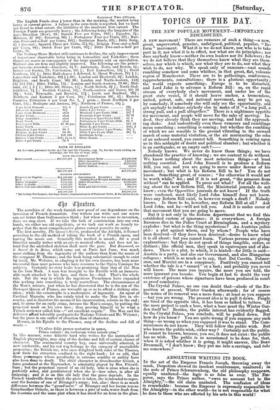Ot quarts
The novelties of the week furnish new proof of our dependence on the invention of French dramatists. Our writers can write and our actors can act better than Gallomaniaes think ; but when we come to invention, there we stop short. If we take the task of construction into our own hands, we either use old expedients, or we tack our work so loosely to- gether that the most comprehensive glance cannot perceive its unity.
The first novelty, The Queen's Secret, produced at the Adelphi, is framed according to the old method of taking the hook of a French opera, and leaving the music out. Generally this method is unsafe ; for a good librettist usually writes with an eye to musical effects, and does not in- tend that the unclothed skeleton shall meet the gaze. But Raymond, ou le Secret de la Reins, which came out at Paris last June, was much more striking from the ingenuity of the authors than from the music of the composer M. Thomas ; and the book being substantial enough to exist by itself, Mr. Webster, in adapting it for his own theatre, has been more successful than most persons who have recourse to the Opera Coraique for subjects. Certainly no story looks less promising than that of the Man in the Iron Mask. A man was brought to the Bastille with an immove- able mask attached to his face, and there he—died. That's the whole tale. But the way in which the ingenious Frenchmen have expanded this nothing into something is truly marvellous. The circumstances of the Man's seizure, just when he has discovered that he is the eon of the Dowager Queen of France, are wrought up so as to afford a striking situ- ation; while the catastrophe is a masterpiece of ingenuity. An agent of Cardinal Mazarin, who has vainly tried to make the Man live in ob- scurity, and is therefore the means of his incarceration, relents in the end ; and, to atone for an early crime, favours the Man's escape, by putting the perpetual mask on his own face ; thus proving himself to be what a French reviewer called him—" eet excellent coquin." The Man and his deliverer afford tolerably good parts for Madame Celeste and Mr. Webster; but the piece is one rather of situation than of character.
Horace, in his Epistle to the Pisones, sang of the decline and fall of words-
"IIt ailvte foliis pronos mutantur in annos, Prima cadunt ; its verborum vetus intent rotas."
In like manner, some didactic bard who writes for the instruction of English playwrights, may sing of the decline and fall of certain classes of character. The sentimental country boy, once universally admired, is now intolerable, and his red wig belongs to the category of unavailable properties; the British tar, who once delighted both sides of the Thames, now Ends his attraction confined to the right bank ; let us add, that those personages whose peculiarity is extreme senility or anility have also been done to death. The chief character in Grandmother Grizzle, a farce produced at the Haymarket, is admirably played by Mrs. Fitzwil- ham ; but the perpetual squeal of an old lady, who is cross when she is perfectly sober, and goodnatured when she is—less sober, is after all fatiguing; and it is on this old lady that the piece depends. In the French vaudeville from which the piece is taken, she is intended to repre- sent the heroine of one of Beranger's songs ; but, alas ! there is as much difference between the "grand'mere " of Beranger and her locum tenens Grandmother Grizzle, as there is between a pint of soda-water fresh from the fountain and the same pint when it has stood for an hour in the glass.


























 Previous page
Previous page